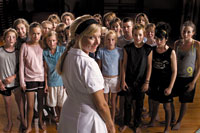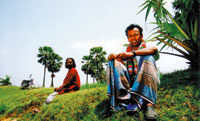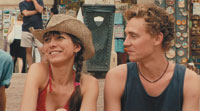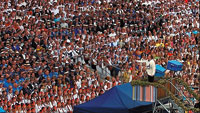Tickets still available for Wisconsin Film Festival
If the idea of an international film festival makes you think of a red carpet, glamorous movie stars and photographers snapping their flash bulbs, talking to director Meg Hamel about the Wisconsin Film Festival will give you the real story behind the popular event.

“The Substitute” (Denmark, 2007, 90 mins.). Saturday, April 5, 11 a.m., Orpheum Main Theater.
“It’s a physically demanding event that really gets your biceps in shape,” she says. “Films are shipped in metal containers that weigh up to 70 pounds each. I look forward to the time each year when I can leave the computer behind and start lugging film prints to the theaters.”
As this Arts Institute event has expanded each year, more theaters are joining as hosts. Notable in 2008 is the return of the Majestic Theatre just off the Capitol Square, which was a festival venue in the past but was shuttered last year when the building was for sale. New owners Scott Leslie and Matt Gerding made a commitment to keep the Majestic’s tradition as an historic movie theater alive, mixing occasional big-screen events into their regular calendar of live music performances.

“Swopnodanay” (Bangladesh, 2007, 88 mins.). Saturday, April 5, 7:15 p.m., Madison Museum of Contemporary Art.
The Chazen Museum of Art has also joined the circle of campus theaters that present the festival. Two lecture halls on its lower level will be transformed into screening rooms for the Wisconsin Film Festival. Hamel says, “We’re looking ahead to the construction of the new second building in the Chazen complex. For now we’re fitting out the spaces with state-of-the-art video projection, but in the new building there will be a proper 35mm film theater.”
Hamel works with staff members of the Department of Communication Arts and with members of the local stagehands’ union to completely overhaul the film projectors in all the film theaters. The Wisconsin Union Theater, for example, has a set of vintage carbon-arc projectors, which are used for a handful of movies each year. “Instead of a bulb, these projectors are lit using a stick of burning carbon, which creates a light that is actually quite magical. We’re very fortunate to have these projectors available to us, although it takes a lot of elbow grease and new parts to get them into shape to run 12 films over three days.”

“Unrelated” (United Kingdom, 2007, 100 mins.). Saturday, April 5, 8:30 p.m., Bartell Theater.
Hamel hopes that the work put in by the festival’s all-volunteer technical team will encourage the Union to show more movies there through the year. “I’d like a chance to see a picture there,” she adds.
During four days, the festival will show 220 films, making a grand total of 1,356 films in its first decade. “When I started doing the math, I knew it would be a nice big number, but in truth it’s a little staggering,” admits Hamel. “Most of these films wouldn’t have been available to audiences here. This number represents the major impact that this festival and the university have had on the cultural climate of our state.”

“The Singing Revolution” (USA, 2007, 96 mins.). Saturday, April 5, 11:30 a.m., Stage Door Theater.
The festival partners with other campus programs to present films related to the university’s academic mission. Many of these unusual movie experiences have come through the inspiration of other departments.
Hamel gives an example: “Jim Leary of the UW Center for the Study of Upper Midwestern Cultures suggested some films that recorded folklore traditions of our region. They were interesting, but not quite right for the festival. When the center received a new generous grant for Baltic culture from an individual donor, Jim challenged me to find a film from the Baltic region.”
The result is “The Singing Revolution,” a documentary by James Tusty and Maureen Castle Tusty, which chronicles the nonviolent revolution of Estonia under Soviet rule, centered on that nation’s annual song festival. Guntis Smidchens, a scholar of the Estonian folklore movement from the university of Washington, will introduce the film at its Saturday, April 5, screening.
“This,” says Hamel, “is what the Wisconsin Film Festival is all about. Working collaboratively with colleagues at the University and in the community, letting little grains of ideas grow into something real. And this movie, like so many others at this festival, is moving and beautiful with its gorgeous choirs and powerful spirit. I get choked up just thinking about it, and I’ve watched it three times.”
The Wisconsin Film Festival runs Thursday, April 3–Sunday, April 6, in 11 locations in central Madison. Tickets for the Wisconsin Film Festival are available at Wisconsin Film Festival and at the Festival Box Office, 265-2933, in the Memorial Union; $7 each or $4 with student ID.
